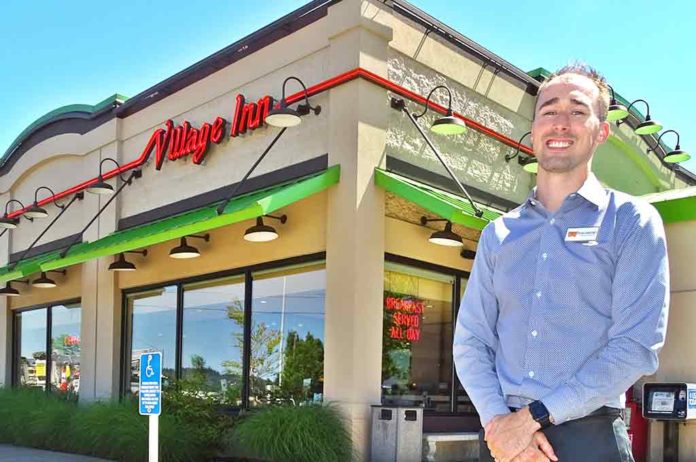 The Village Inn is a popular restaurant adjacent to Bridgeport Village where third-generation co-owner Ryan Sweeney was planning to spend his career, but now that plan is up in the air.
The Village Inn is a popular restaurant adjacent to Bridgeport Village where third-generation co-owner Ryan Sweeney was planning to spend his career, but now that plan is up in the air.
Representatives from Metro, TriMet, Washington County and the City of Tualatin met with Sweeney a year ago and showed him a map of the proposed terminus of a future light-rail line at the I-5/Lower Boones Ferry Road interchange where the restaurant is located.
“We were planning our 40th anniversary celebration for June 19 when they met me here June 9,” Ryan said. “They rolled out a big satellite image of the area with a blueprint over it, and our building was engulfed by the terminus. They said they need our building (space) for a bus turn-around.”
The transformation of the Bridgeport area continues to amaze Sweeney, who grew up a stone’s throw away off Lower Boones Ferry Road as a third-generation member of his family to live there. His grandpa started the family restaurant business in 1968, opening a Village Inn franchise at the Lloyd Center followed by another one at the original Tualatin location. When Bridgeport Village and the huge intersection at Bridgeport Road/Lower Boones Ferry Road were being planned, the original restaurant located southwest of the current location was in the way, so the family was offered a brand-new, turn-key facility at the current location to replace it.

“We closed one day at the old location and opened the next day at the new location,” Ryan said. “In the last year at our old facility, sales dropped, and after we opened at the new one Oct. 17, 2004, our sales doubled… This area is a magnet for people from all over.”
But now the business might be forced to close. For the past several years, the Southwest Corridor Steering Committee, which is made up of representatives from Metro, TriMet, the Oregon Department of Transportation, Washington County and seven Washington County cities, has met to refine plans for a 12-mile-long, light-rail line between downtown Portland and Bridgeport Village. It is publishing a Draft Environmental Impact Statement for a 45-day public review and comment period, which is required to qualify for federal funding from the Federal Transit Administration.
According to Sweeney, he was told that if he has to close the restaurant due to the light-rail project, he would be provided with help identifying relocation sites; professional services such as architecture; reimbursement for site-search costs up to $2,500; reimbursement for personal property that can’t be moved or is obsolete, and re-establishment expenses up to $25,000 or a lump sum in lieu of relocation benefits based on the previous two years’ earnings, up to $40,000.
“But they are offering nothing for lost income,” said Sweeney, adding that “there is no way to recreate this business except to move it far away, but we want to stay close to keep our loyal customers.”
Sweeney finds himself in limbo because of all the uncertainty. He could go ahead and make plans to re-open the restaurant elsewhere, but there is a chance the whole project could fall through if voters fail to support the light-rail project by approving a bond measure on a future ballot.
“A ton of groups meet here,” Sweeney said. “I started working here on Mother’s Day when I was 15 years old. Mother’s Day is the busiest day of the year. I have done every job – host, cashier, service. I plan to keep doing this in some fashion, but starting at a new location is risky.”

The family’s history in the community runs deep and includes a romance: Sweeney’s step-dad, longtime Village Inn customer Steve Watt, got up the nerve to ask Sweeney’s mom Connie out on a date years ago, and they later got married. Sweeney owns 40 percent of the business, and Connie owns 60 percent.
“The average employee has been here more that eight years, but it’s more than that – it’s the customers we would be leaving,” Sweeney said. “And as equipment comes up for replacement, how much do I invest in it if we might not be here?”
Just a month before the June 2017 meeting, Sweeney inked a deal with a relative who helped the family get the restaurant started, to make payments for the next 15 years as repayment.
“This is a tough situation to be in as a business owner as far as making long-term plans,” Sweeney said. “If I wait until everything is final, then it is too late to go in a new direction. My business is the least of their concerns. It’s frustrating.”






















